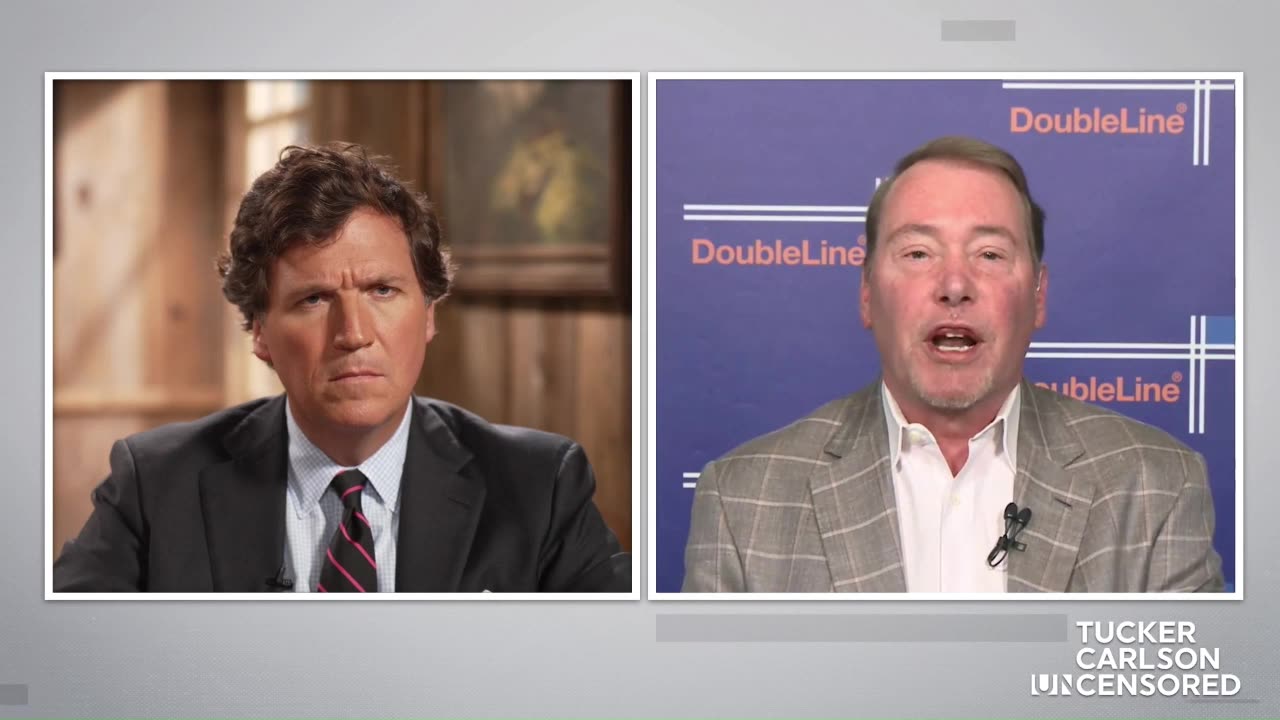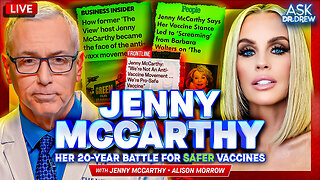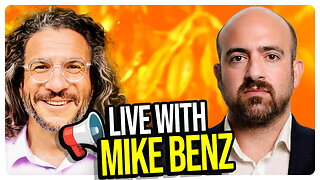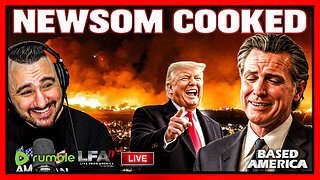Premium Only Content

TUCKER Uncensored: Is the Fed lowering rates to help Biden ,or much scarier than that
The Fed, Biden and Economic Chaos Is the Fed lowering rates to get Joe Biden reelected, or is the truth actually much scarier than that? Jeffrey Gundlach explains.
READ THE TRANSCRIPT
Tucker [00:00:00] About three weeks ago, Jay Powell, the chairman of the Federal Reserve, announced that it was, "premature to conclude with confidence that we have achieved a sufficiently restrictive stance or to speculate on when policy might ease." That's Fed-speak and in case you're not familiar with it, that means we plan to keep interest rates high. Okay. Then last week, two weeks later, with no warning at all, Jay Powell seemed to pivot dramatically and say almost the opposite. Actually, he said, cutting interest rates is something that, quote "begins to come into view" and is clearly a topic of discussion out in the world and also a discussion for us at our meeting today." In other words, we are lowering rates. So many people who are paying attention, concluded that this was political. Joe Biden is losing the race and the Fed is trying to save him. But what if it's even worse than that? What if it's not just Joe Biden they're trying to save, but the US economy? What if the fundamentals are so weak underneath that the Fed is desperately scrambling, groping in the dark to figure out what to do. You have to think that's possible. The Fed is supposed to be stable. That's why they speak like 19th century jurists to convey stability. But if they're changing their mind and the biggest question that they address in two weeks, one direction, another direction that suggests chaos, and that's bad. For an informed guess and what exactly is going on, we turn to Jeffrey Gundlach. He's one of the most famous investors in the country. He's founder and CEO of DoubleLine Capital. Mr. Gundlach, thanks so much for coming on. So first to Powell's apparently contradictory announcements just a couple of weeks apart. A lot of people looked at this and said, well, you know, it wouldn't be the first time the Fed responded to political imperatives from the White House. Do you think that's what's happening?
Jeffrey Gundlach [00:01:57] I don't think that's the primary factor that's going on here, although it is interesting that that pivot that you mentioned is so radical. I think that what's going on is that interest rates have fallen at the long end of the maturity spectrum. So ten year treasuries, thirty year treasuries, and they've fallen to the point that they're well below where the Fed has short term interest rates. And the Fed almost always takes notice of that. And it's gotten to be pretty extreme. And so that's one of the major factors, I think, that they're aware of history and the way that the interest rate cycle works. So I think that's that's a big piece of it. I also think that the Fed is noticing that the inflation data is moderating to a point that's getting close to what they hope to achieve. What I mean by that is there's all these different inflation indices, the CPI, the PCE, you can almost pick anyone you want. But if you look at the one that the Fed uses the most, which is the PCE, Personal Consumption Expenditures, they if you take a look at recent months and annualize them, they're basically right at the Fed's target. And so inflation went up much faster than they expected back a couple of years ago. And they were tardy in raising interest rates. They should have raised them much sooner. So inflation actually on the CPI got to over 9% on the high, which is sort of Jimmy Carter esque. And so they had to go into radical interest rate increases. But one thing that is lurking beneath the surface, and I think this is the primary variable, is there is an enormous amount of debt that the Treasury has to refinance over the next three years. There's $34 trillion of national debt, which is shockingly high. And it was facilitated by the fact that the Fed kept interest rates at zero for such a long time. When interest rates are at zero, you can borrow an infinite amount because you have no interest expense. But all of a sudden interest rates are up by five and 3/8 percent or five and a half percent. And now we have $17 trillion of Treasury debt that's maturing in the next three years. And if interest rates stay where they are, it's going to cause a tremendous squeeze on revenue because already we have a high percentage of tax receipts that go to interest expense, and it would go much, much higher. The CBO, the Congressional Budget Office, projects where deficits are going and where interest expense is going and all that stuff. But their assumptions are no longer really valid. They assume that the national deficit will be at around 3-4% of GDP. Well, it's already above 6% of GDP and we're not even in a recession. They also assume the interest rates will stay at around 3-4% and they're starting to get to 3-4% type of level. But they were up at five and a half percent or 5%. And if you just do the arithmetic, you start to realize that the percentage of tax receipts that will go to interest expense becomes completely untenable. In fact, if you assume that we continue to have 6 to 8% deficits, percent of GDP, which is almost a certainty the way this economy is running and you keep interest rates where they are, it's in about five years, you have something like... It depends what interest rates you assume, but you have something like 30, 40, even potentially 50% of all tax receipts going to interest expense. This is a really big problem because we have such a large amount of expenditures that are mandatory. We don't have the money right to to to have interest expense that high. And so I think beneath the surface, the Fed is looking for reasons to say mission accomplished in a certain sense by taking the last 3 to 6 months of inflation data, analyzing it and saying, well, maybe we don't need interest rates this high and maybe we have to worry about this problem. Also I do think that it is typical in a presidential election year...This is that secondary variables that you brought up where they just don't really want to change things very much. And so the Fed has gotten to this place where they want interest rates to sort of stay where they are. They're clearly not talking about hiking in them anymore, and they may cut them depending upon what happens to the inflation data and ultimately the stock market. The stock market dropping is really the thing that is the straw that breaks the Fed's back when it comes to giving up on maintaining higher interest rates. You might remember back in 2018 we had a meltdown in the stock market in the fourth quarter. That came about when Jay Powell said we're going to have interest rate increases on autopilot and we're going to continue to buy back some of the bonds we have on our balance sheet, are going to let them go back in the market. And the stock market dropped like 20% in a few weeks. And suddenly the Fed did a complete reversal, even more radical than the rhetorical pivot that they did in the past several weeks. They just suddenly started slashing interest rates down to zero again. So one thing I want to point out is the world has fundamentally changed because of the zero interest rate policy. You know, we have all of this debt. It was made possible by zero interest rates. And in the past, decade after decade, when you had low unemployment, you had low deficits. That makes sense. When there's low unemployment, you don't have to pay so much unemployment benefits. You have higher tax receipts because more people are employed. But starting in 2015, something changed. We've had low unemployment since 2015, and yet the deficit has been rising since 2015. This is unprecedented. To have a rising deficit was considered to be close to full employment. So we have a debt based economic scheme. The deficit as a percent of GDP is running above 6%. People talk about this is a good economy, but if we actually didn't run a budget deficit, if we had a balanced budget, GDP would be negative over the last 12 months. And so this is the fundamental problem. And I think that's factoring somewhat into the Fed's logic. But it's not tenable. We cannot keep going on with this deficit based scheme. I think people are starting to understand that.
Jeffrey Gundlach [00:08:23] It's amazing how many things have so fundamentally changed. You know, when I was in college, there was this Green Peace movement and there and their motto was Save the Whales. And now the environmentalists movement is killing the whales with windmill construction in the ocean. You know, when I was in college, I went Dartmouth College near the Vermont-New Hampshire border. It's in New Hampshire. There were a lot of sort of hippie types that had bumper stickers that said "Split wood, not atoms." And now what are we doing? We're saying zero carbon. We're now saying anything but split wood, anything but burned coal. So everything changes. You know, the women's movement was a big deal back in the seventies. Women's rights, equal opportunity. Now it's the opposite of that. At least in athletics, women are under attack. So it's weird how everything changes, but that's the way society and long term economic cycles work is that things that were norms in the past become outdated as as societal conditions change, attitudes change, the means of production change, and those norms just can't hold up. And we're in one of those radical transformations. Of course, we see that in the political spectrum where, you know, everyone thought the 2016 election was wacky and then the 2020 election turned out to be wackier. And I think everybody can sense that the 2024 election is going to be the wackiest of our lifetime.
Tucker [00:09:56] Yeah, if not in American history. I would also say that in 1980 there are a lot of people on the left who promoted peace, not cluster bombs. So it's now the war party. But I have to ask you when you got into this business, you know, 40 years ago or whenever, was the stock market wholly controlled by Fed policy? Because it does seem now that the stock market is just a function of what the Fed decides on rates. Has that always been true?
Jeffrey Gundlach [00:10:26] Not at all. Not at all. I mean, I remember the moment from 1977 to 1982 where the stock market just went south because the Fed was battling inflation. The Volcker Fed.\ And so you had the stock market go down to incredibly low price earnings ratios because the Fed was doing the responsible thing. And the bottom of the stock market was in 1982. And it's been going up very radically since then. And it's been aided and abetted by zero interest rate policy by the Fed. You know, when the Fed first went to zero interest rate policy ten years ago or so, everyone thought that it was going to be very temporary, but it lasted for a very long time and it keeps getting reinstated. So I believe that interest rates have bottomed on a long term cyclical basis. I think they will fall in response as they're falling in real time in response to weaker economic thoughts and weaker economic data as people are looking at the potential for recession from many indicators like the leading economic indicators, the sentiment indicators, the fact that long term interest rates are below short term interest rates. And everyone thinks that they know how the economy works and interest rates work, but their knowledge is informed of 40 years or nearly 40 years of falling interest rates. And now interest rates are secularly rising, in my opinion. I do expect that this Pavlovian response of potential economic weakness leads to lower interest rates in the short term. I think interest rates will continue to fall in the short term, but then the deficit problem is going to really expose itself because the response ultimately to negative GDP, which I expect we will have by the middle of 2024, the response will be more of the same, which is the inflationary policy that we ran in 2020 that we're now trying to reverse. But that's the only game that they have, is to go to zero interest rates and then to run massive budget deficits. So the deficits already 6% of GDP. It's possible it will be 9% of GDP, it's possible it will be 15% of GDP in response to next recession. And then everyone is going to look at the interest rate structure and say, oh, my golly, you know, this is a real problem with this massive deficit. We're going to not be able to really refinance this debt. And I think that's going to lead to a crisis in the dollar, which will lead to a crisis in the economy.
Jeffrey Gundlach [00:13:01] One thing that the Fed doesn't seem to understand, which kind of surprises me, or maybe they do and they just don't want to talk about it - I think I prefer that interpretation - Is that what they did by keeping interest rates so low is they forced banks to invest their deposits into very low interest bearing securities. And then interest rates go up and we see the Fed funds rate is still up at 5 and 3/8. And the assets that many large banks, very large banks own, they're only yielding 3%. So they're losing money every second of every minute of every hour of every day on that carry. And so higher for longer is devastating to the banking system. So it's no surprise that while the stock market has done well, certainly over the past couple of years, it's back up to the highs now. The high was really two years ago and back at that high, the banking sector has done nothing because they're they're in a dire situation. And so we saw a little whiff of that problem with the regional banks, with SVB back in March, where they were so underwater on their portfolio and their depositors fled and so they had this crisis and they had to be shut down. That's not the problem at the money center banks, because their deposits are at much lower cost. But it's still a problem as the higher for longer regime continues. And I think this is going to be evident in the coming year. So I think it's going to be a real issue for the election. You mentioned the Fed might be influenced by the election. I think the election is going to be very influenced by economic volatility in 2024, which I think is going to be hard to avoid.
Tucker [00:14:44] So what happens, though, when the the debt crisis, the refinance crisis you've mentioned a couple of times happens when it's just too expensive, so it's default or massive tax increases or what goes on then?
Jeffrey Gundlach [00:15:02] That's exactly right, Tucker. It's some combination. We have an economy that's around $25 trillion of GDP, and we have a deficit, a national debt that's $34 trillion. And that sounds bad just with that. But beyond that, there's a lot of unfunded liabilities that are coming in the future. And that has to do with Medicaid, Medicare, Social Security, unfunded pension plans, you know, local municipal budget deficits and all that. Those total, too...are you ready for this, Tucker? $210 trillion in unfunded liabilities, which is about seven and a half times GDP. If you wanted to actually pay those off in today's money, basically it would take 70 years, basically with a 10% of the economy going to pay off these liabilities. In other words, we'd be in a depression for three generations. So that option is not really going to be taken. So what we have to do is we have to restructure these liabilities, which means partial default on Social Security. I've been talking about this for 20 years. What I mean by default is you raise the age requirement, you means test it, you reduce those liabilities. But that probably isn't enough either. You probably are going to run something of an inflationary policy that will lead to basically a total reset, a total reset of the financial structure. Just as I said several minutes ago about how the way people think about, you know, save the whales versus they'll kill the whales, women's rights versus anti women's rights. All of these are tells that we have to reset to a place where everybody can feel that they're invested. This is all part of...Some people call it the Kondratiev wave. There's a man named Neil Howe who's one of the best demographers in America that wrote a book called The Fourth Turning Back in the nineties. And using demography, he predicted that we would have a debt crisis, the global financial crisis around 2006. Pretty accurate. So what he relies upon is this thing called societal turnings. And we're in the fourth turning now. In fact, Neil Howe just wrote a new book called The Fourth Turning Is here, something I'm paraphrasing perhaps, but around those lines. What that means is we have gotten completely out of sync between what's called...this is using Karl Marx's political philosophy, the means of production and the societal and the property relations. The means of production can change in a revolutionary way, and they always do. Radio, railroads, you know, Internet.
Tucker [00:17:49] Steam engine.
Jeffrey Gundlach [00:17:51] All that. And the property relations are ossified because the people that are wealthy want to increase the probability that they will remain wealthy. And so they don't want the property relations to change because they're the winners on the property relations. But the means of production change and get a very strong tension develops between the means of production, the property relations. And that's where we are right now. And you can see that with this massive amount of wealth inequality and what's becoming a relatively obvious two tiered system of people that have the levers of power that don't have to pay any taxes, and the people that are just a notch or two below those levers of power that get, you know, 87,000 more IRS agents unleashed on them. And so we clearly see that tension has developed and it can't be sustained. And when the next recession comes, the response to the recession, which will be the same one we've been using now for 20 years, which is, you know, negative interest rate, real interest rate policy and the deficit spending is going to blow up with the dollar really falling. And I think the dollar has peaked and it's right on the edge of breaking below its trend line, which is something that's kind of wonky, but something that I look at as an investment tool. And if it drops at all meaningfully, I think we're going to be looking at a trend to a much lower dollar, which will ultimately lead to more risk of inflation after we respond to the recession that's coming. I know that this doesn't sound good, but there is one good thing that I learned yesterday. I want to say something optimistic, and that is that applications to trade schools have bottomed out and are now actually booming, which is partly, I think, reaction to the nuttiness that's going on at university campuses. But thank goodness we can finally start to take care of the basics of the trades which have been neglected for years as people have been sold the false hope of getting a worthless degree in leisure studies and thinking that is somehow going to create a path for you economically in this economy, which of course everyone's realizing that that's not the case.
Tucker [00:20:05] Yeah, not everyone can be in marketing. So a couple of questions. So if you get to that place where we partly default on some of our entitlements, you mentioned Social Security... Do the holders of the debt, bear any of the pain at all?
Jeffrey Gundlach [00:20:20] Maybe. I think that's a possibility because you have to use every tool in your kit so you can restructure the liabilities somewhat. But you can also talk about why not refinance the Treasury debt at a zero coupon? That's something you could do. It would be radical. It would be a disaster for future financing. But on the existing debt, you could just by fiat lower the interest rate. I mean, I keep talking about how these norms are changing. You know, a few years back, people used to say the only things that you still owe when you declare personal bankruptcy are your taxes and your student loan debt. Well, the first shall be last and the last shall be first. Now they're canceling the student loan debt. It used that was one of the two things that survived bankruptcy. Now that's the first thing that's being canceled. So these norms are all changing. And so if you can cancel student loan debt, which was one of the two things that could not survive bankruptcy, of course, you can in part cancel some of the interest expense on the existing federal debt. There's no difference between those two. This Pandora's box all got opened during the global financial crisis where there's loan documents were written that you cannot modify mortgages. Well, desperate times call for desperate measures, I guess. And so they modified millions of mortgages so the rules can change. One thing you learn as you get older, when you're 12 years old, you assume that the world has always been the same and will always be the same. And then as you as you age, you start to realize, no, that's not the case. There is nothing that set in stone. Everything can be changed. And so, I mean, we're back to talking about changing... The Constitution is going to be changed I think. I think we're looking at a very large generational, multi-generational reset. We don't make the mistakes our parents made. We make the mistakes that our grandparents and great grandparents made. And that's why these cycles seem to be sort of 75 years in length. And there was the Civil War, then there was World War II, and now look where we are. We're about 75 years after that. And so this is somewhat predictable, if not totally predictable, as I talked about the demography aspect of things.
Tucker [00:22:33] So I want to just expand on that a little bit. By the way, I can see why you've done well in investing. I mean, these are wise observations and principles I think that you're explaining. But demography and the fourth turning and you know who lives here and what age they are and all that. These are these are the factors that determine a lot of things including our culture and your economy. We're changing the demography very, very dramatically, in fact, at a faster pace than any time in American history, tens of millions of new people. What effect does that have on the economy specifically, do you think?
Jeffrey Gundlach [00:23:07] Well, it provides a lot of volatility. Clearly, it changes, you know, how the pie gets split up, how the economic pie gets split up. And that process is painful. And that's what we're experiencing right now. Ultimately, though, it turns into the first turning. We have a lot of labor. We have a lot of young people. I mean, there are a lot of negatives about all of this flood of illegal immigration. But there's also ultimately long term potential benefits once you work through the problems of it. It will reduce inflation, it will create production. These things are the ultimate benefits. Unfortunately, we have to live through - we have to walk through the valley before we can get to the other side. So that's the sad truth of it. You know, I remember again, about 15, 20 years ago, we were hiring people that were quants to help us with our qualitative research. And we hired� some people from China. And to hire people from China was really hard. You had to sponsor them for a green card and you had to make an assertion that that person had a unique skill set that you were unable to find with an American citizen. That was how hard it was to get somebody in from China. Just think how different that is. I think yesterday, 12,600 people came into this country and none of them have any education, let alone have a unique skill set you can't hire a citizen for. So nothing is purely good. Nothing is purely bad. But I do think that we're dealing with the bad piece of this immigration influx before we get some of the benefits. So it's cheap labor is what it is. I think Nancy Pelosi actually sort of admitted it when she went off script and said we need them to pick the crops down in Florida.
Tucker [00:25:03] And so last question. If if you were to kind of model out to the extent you can be blunt about it, what the world looks like or this country looks like in November of 2024, economically, what would you think?
Jeffrey Gundlach [00:25:20] I think we'll see a recession before November of 2024, and I think that's going to cause an awful lot of anxiety. And I've been talking about the potential for the 2024 election. I've talked about this seven years ago, that it's possible the 2024 election is decided in the House of Representatives. It's possible that we will have no candidate win the majority in the Electoral College and it could go to to the House. Of course, that will require either RFK Jr or No Labels or whoever to come up with a third party candidate or something. But it seems that increasingly these elections are getting won with ever more narrow and more questionable margins. And I don't think 2024 is going to be any exception.
Tucker [00:26:11] Amazing. I sure appreciate you spending all this time and I hope to see you again. Thank you very much.
-
 LIVE
LIVE
Redacted News
1 hour agoBOMBSHELL EPSTEIN NEWS ABOUT TO HIT, MOSSAD TIES EXPOSED
17,387 watching -
 LIVE
LIVE
Dr. Drew
1 day agoJenny McCarthy: After Son's Near-Death Reaction & Autism Diagnosis, Star Fights For Safer Childhood Vaccines w/ Alison Morrow – Ask Dr. Drew
979 watching -
 43:26
43:26
Kimberly Guilfoyle
2 hours agoRestoring the American Dream, Live with Tony Kinnett & Adam Weiss | Ep238
2.08K6 -
 1:47:44
1:47:44
vivafrei
5 hours agoLive w/ Mike Benz! Was Epstein an Intelligence Tool? Maurene Comey FIRED? Ostrich Farm UPDATE & MORE
71.9K26 -
 LIVE
LIVE
Candace Show Podcast
2 hours agoThe Epstein Files: The Midas Touch | Ep 1
4,368 watching -
 2:57:38
2:57:38
The Quartering
4 hours agoRFK Gets Big Win, A "Disney Adults" Dating App, CEO Exposed At Concert & Live Action Assassins Creed
117K17 -
 LIVE
LIVE
Sarah Westall
1 hour agoQuantum Physics: The Blueprint that Bridges Science, Spiritualty & Reality w/ Ian Mitchell & Philipp
123 watching -
 40:47
40:47
Members Club
4 hours agoAngel Reese, Disabled Barbie, and the Death of Standards - MC03
15 -
 9:13
9:13
WhaddoYouMeme
3 hours agoI Watched Superman (2025)…It Exposed Us
1234 -
 LIVE
LIVE
LFA TV
20 hours agoLFA TV ALL DAY STREAM - THURSDAY 7/17/25
1,379 watching